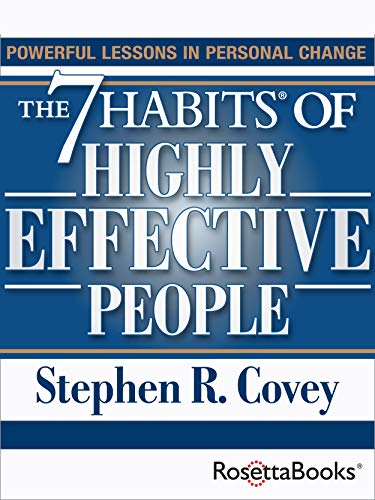
About
Title: The 7 Habits of Highly Effective People Authors: Stephen R. Covey Category:supplementals Number of Highlights: 30 Date: 2022-07-17 Last Highlighted: **
Highlights
Knowledge is the theoretical paradigm, the what to do and the why. Skill is the how to do. And desire is the motivation, the want to do. In order to make something a habit in our lives, we have to have all three.
Proactive people focus their efforts in the Circle of Influence. They work on the things they can do something about. The nature of their energy is positive, enlarging and magnifying, causing their Circle of Influence to increase.
The more aware we are of our basic paradigms, maps, or assumptions, and the extent to which we have been influenced by our experience, the more we can take responsibility for those paradigms, examine them, test them against reality, listen to others and be open to their perceptions, thereby getting a larger picture and a far more objective view.
We are what we repeatedly do. Excellence, then, is not an act, but a habit.
It’s not what happens to us, but our response to what happens to us that hurts us.
Albert Einstein observed, “The significant problems we face cannot be solved at the same level of thinking we were at when we created them.”
“The successful person has the habit of doing the things failures don’t like to do,” he observed. “They don’t like doing them either necessarily. But their disliking is subordinated to the strength of their purpose.”
Paradigms are powerful because they create the lens through which we see the world. The power of a paradigm shift is the essential power of quantum change, whether that shift is an instantaneous or a slow and deliberate process.
Each of us tends to think we see things as they are, that we are objective. But this is not the case. We see the world, not as it is, but as we are—or, as we are conditioned to see it.
Tags:perception
Each of us has many, many maps in our head, which can be divided into two main categories: maps of the way things are, or realities, and maps of the way things should be, or values.
Tags:cognition
Between stimulus and response, man has the freedom to choose.
Tags:perception,cognition
“Management is doing things right; leadership is doing the right things.”
Tags:leadership,favorite,management
The PC principle is to always treat your employees exactly as you want them to treat your best customers.
Trust is the highest form of human motivation. It brings out the very best in people. But it takes time and patience, and it doesn’t preclude the necessity to train and develop people so that their competency can rise to the level of that trust.
Without involvement, there is no commitment. Mark it down, asterisk it, circle it, underline it. No involvement, no commitment.
The key is not to prioritize what’s on your schedule, but to schedule your priorities.
Tags:habits
Look at the word responsibility—“response-ability”—the ability to choose your response. Highly proactive people recognize that responsibility. They do not blame circumstances, conditions, or conditioning for their behavior. Their behavior is a product of their own conscious choice, based on values, rather than a product of their conditions, based on feeling.
Dad had a beautiful definition of leadership: he taught that leadership is communicating others’ worth and potential so clearly that they are inspired to see it in themselves.
Taking initiative does not mean being pushy, obnoxious, or aggressive. It does mean recognizing our responsibility to make things happen.
Tags:initiative,responsibility,work:life